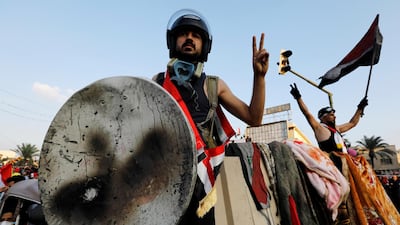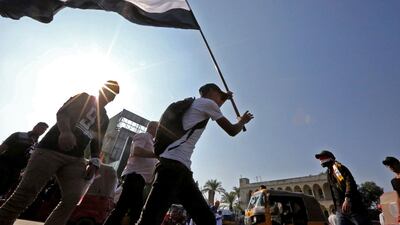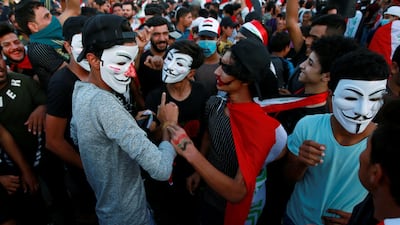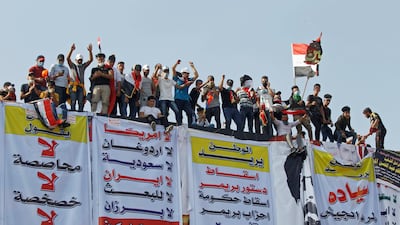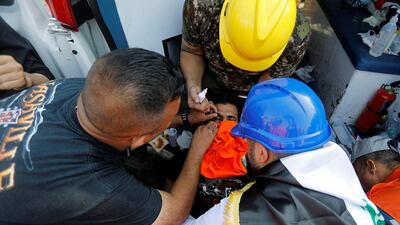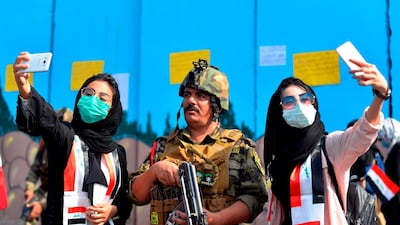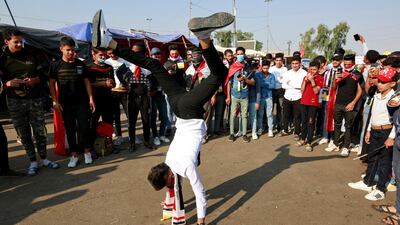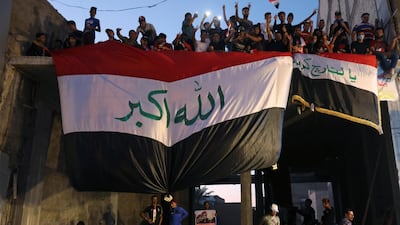Fireworks and tear gas exploded over Tahrir Square on Saturday night, the day after Iraq’s protests entered their second month.
The square was packed to the brim with families, students and young protester as the demonstration has begun to resemble an almost permanent sit-in.
On Saturday, the crowds thinned a little from the record numbers who turned out on Friday amid rumours of a militia-crackdown spread over social media.
But thousands stayed on the street, promising they would not leave until the government fell.
Tahrir Square in central Baghdad now resembles a miniature city, with tents set up providing medical aid, food, water, and even haircuts.
Despite the packed crowds, protesters organised and cleared pathways for ambulances and three-wheeled tuk-tuks to rescue and retrieve protesters injured on the frontlines.
Security forces killed one protester and wounded 91 others in Baghdad on Saturday, security and medical sources told Reuters. The latest casualties add to the more than 250 who have been killed since the protests erupted at the start of October and 8,000 have been wounded. Security forces have fired rubber bullets and teargas directly towards crowds of protests, hitting some in the head and chest.
Iraq’s semi-official human rights commission said that 120 people were injured in a southern port town when security forces fired tear gas and live bullets to disperse hundreds of protesters near the vital Umm Qasr port on the Arabian Gulf on Saturday.
Many of the protesters are young men and women, most below the age of 30, who have grown up in the era following the 2003 American invasion of Iraq that toppled Saddam Hussein.
They are angered at endemic corruption, poor service provision and unemployment presided over by the same faces in government for sixteen years.
Iraq ranks 168 out of 180 countries for the perception of corruption, according to Transparency International. Despite Iraq’s immense oil wealth, one in five people live under the poverty line. Youth unemployment stands at 25 per cent, while young people under the age of 25 make up 60 per cent of Iraq’s 40-million population.
“The corrupt have taken over the country,” said Ali Shuhada, 21, a film student. “People don’t have homes or food, there are people on the street. Students graduate and have no work, they have no salaries.”
But the government does not seem likely to meet protesters demands.
Reports surfaced over the weekend that Qassem Suleimani, the head of the Iranian Revolutionary Guard’s Quds Force, visited Iraq for a clandestine meeting with influential politician Haidi Al Amiri, who heads of one of Iraq’s largest parliamentary blocs and leads the Iranian-backed Badr Organisation.
Prior to the meeting, Mr Amiri and prominent cleric Muqtada Al Sadr, whose Sairoun coalition holds the greatest number of seats and parliament, had reportedly been in talks to oust Iraqi Prime Minister Adel Abdul Mahdi. Mr Suleimani reportedly instructed Mr Amiri to continue to back the prime minister, and the deal with Mr Sadr appears to have subsequently fallen apart.
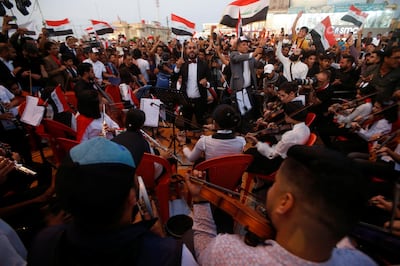
“The Iranian Supreme leader has decided that the protest movement in Iraq poses an existential threat to Iran because of the risk of further spread of those protests into Iran,” said Jennifer Cafarella, the research director at the Institute for the Study of War (ISW). “So the Supreme Leader is treating Iraqi protests as equivalent in some ways to a major renewed protest movement inside of Iran. And that’s why the Iranians are going to such lengths to try and kill this in Iraq, to contain it there, because they’re that worried about their own stability in Iran.”
But even if Mr Mahdi were to resign, protesters say the government would still be far from meeting their demands.
Young people in the square say they not only want the removal of the current government but also want a deep, systemic overhaul.
“We want a complete change of government,” said Athir Najem, 25, a graduate in acting.
Mr Suleimani also reportedly advised top security officials on how to respond to the first round of protests, telling them, “We in Iran know how to deal with protests.”
Over 150 were killed at the beginning of October, as snipers took aim at demonstrators on the ground.
A government investigation later found that 70 per cent of deaths between October 1 and 9 were caused by live bullets.
The protests took a brief pause around the holy Shia pilgrimage of Arbaeen on October 19 and 20.
But since the second round of protests broke out on October 25th, security forces have targeted protesters heads and bodies with military grad “skull-shattering” tear gas canisters, according to a report by Amnesty International.
Despite the violence, Iraq’s young protesters say they are not afraid and will stay in the square until they achieve a complete change in government and Iran ends its interference in the country.
“What we’ve seen from these protesters is a remarkable resilience and commitment to taking risks to hold accountable this government and to hold accountable Iran for its maligned role in Iraq,” said Ms Cafarella.
“Why do we want them [Iran] out,” asked Mr Shahada. “Because they are the ones aiming at us. Those from the riot forces follow the parties and the parties follow Iran… so for that, we say Iran, out, out.”
Iraq’s Foreign Ministry issued a statement on Saturday that also pushed back against foreign influence over Iraq. “No person, group, side, international or regional party may take away the will of Iraqis or impose their opinion upon them.”
Protesters have also gained the support of Iraq’s religious elite, with Iraq’s most senior cleric
Iraq's top cleric, Grand Ayatollah Ali Al Sistani, used his Friday sermon to warn against foreign interference in the protests in what many took to be a comment directed at Tehran by a man whose word can make or break governments. He also cautioned that continued violence could lead to “civil conflict.”
"No person or group, no side with a particular view, no regional or international actor may seize the will of the Iraqi people and impose its will on them," he said.
Protesters have remained peaceful despite the violence facing them from security forces, but Ms Cafarellafeared that if suppression continues and the government remains unwilling to meet demands for change, then protesters could face a bleak choice.
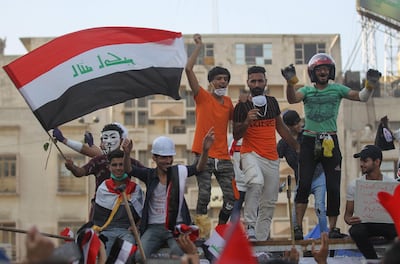
“I’m of course worried about the potential for the loss of lives within the protesters if, in fact, the Iranians decide to conduct another round of violence,” she said. “I think the protesters, as a whole, will essentially have two choices which every protest movement which faces violence has. First, disperse, go home and survive and give up the revolution. And two fight back.”
But protesters themselves insist they will remain peaceful, no matter how much violence they face from the security forces.
“We will continue peacefully, said Ali Khrypt, 27. “Peace is very important because violence does not give birth to a nation, it does not bring rights.”
Mr Khrypt’s friend, human rights activist Safaa Al Saray, was killed when he was hit in the head by a tear gas canister on the Jumhuriya Bridge on October 28.
Mr Khrypt spoke as he sat in a makeshift funeral tent for the young man. “The law says every Iraqi has the right to demonstrate and lift our voice,” he says. No matter how they attack us we will not stop being peaceful.”
